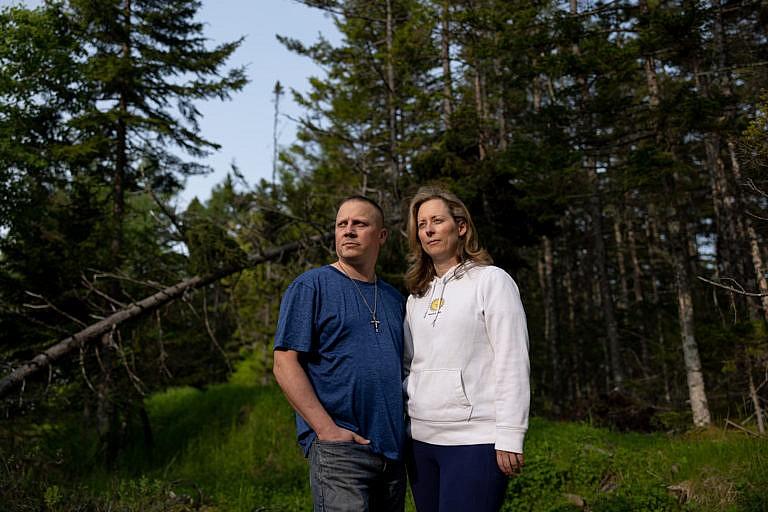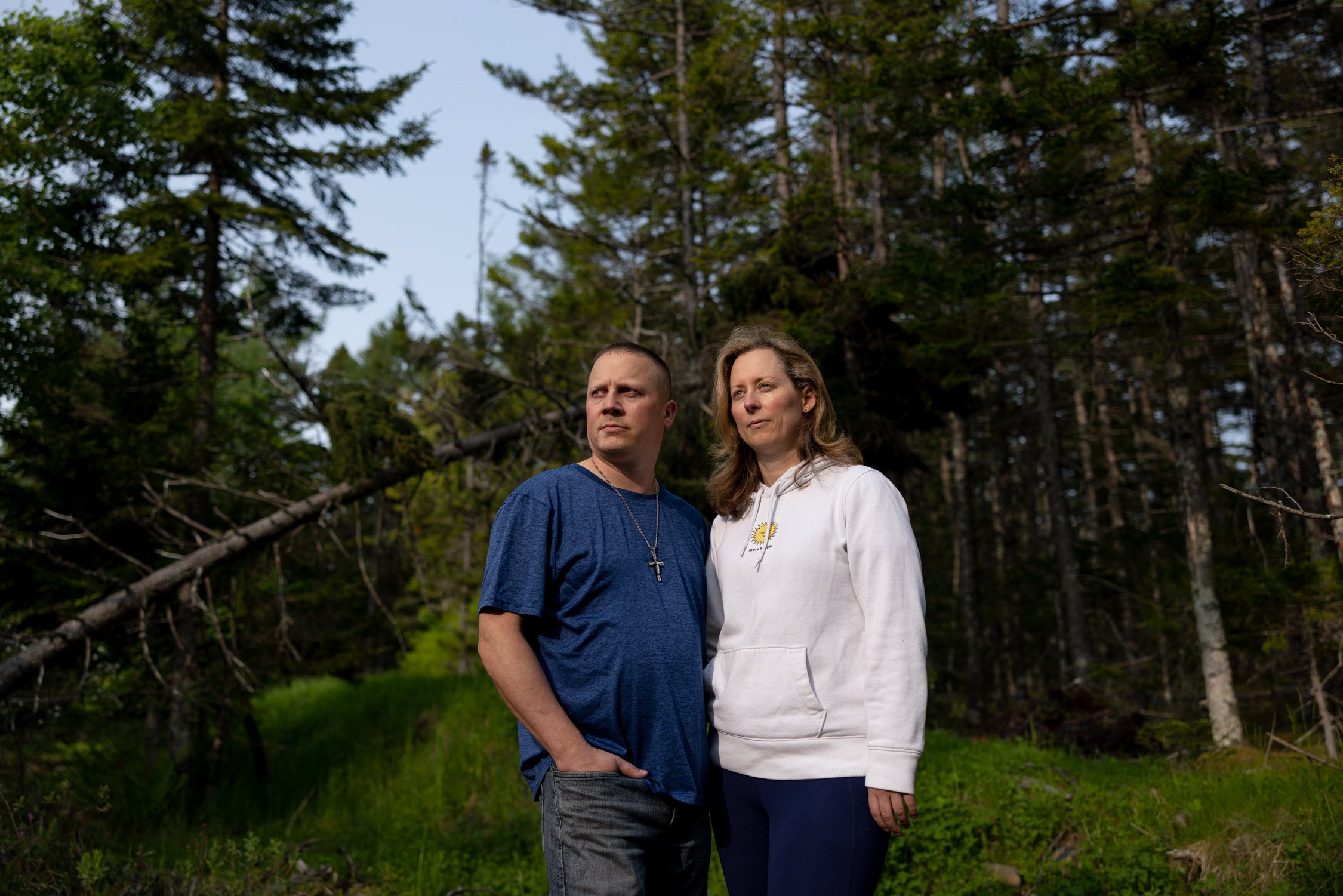We rode a grief bus back to our burned-down home
“It was cathartic and soothing. It provided us with a sense of finality.”

Share

Days after wildfires tore through suburban Halifax earlier this summer, the city invited displaced residents onto public-transit buses to tour their ravaged neighbourhoods. Called “grief buses,” these vehicles give residents the opportunity to visit the charred remains of their properties and come to terms with the devastation.
Mary Young, a resident of Highland Park, never expected to find herself on a grief bus. She lived a typical suburban life with her husband, Jason; two daughters, Alina, who’s 12, and Mia, who’s 13; and two dogs, Jasper (a mountain doodle) and Theo (a half-Chihuahua rescue). Then, on May 28, hellacious wildfires ripped through the neighbourhood and destroyed their house. Here, Mary recounts the experience of evacuating and how a ride on a grief bus helped her find some closure.
What was your life like before the wildfires?
In the summer of 2018, we moved into a 2,100-square-foot back split in Highland Park, about a 30-minute drive west of downtown Halifax. It’s a wonderful, family-oriented community, the type of place where you look out the window and see all the kids outside, riding their bikes and playing street hockey. Neighbours say hello when you’re out on the street.
I’m a teacher. Jason is a production manager. Life was simple, but nice. We were working, raising our kids, walking the dogs. The house had four bedrooms and three bathrooms. We had a shed, a trampoline, a firepit on the lot. When the sun set in the backyard, where I would toss the ball with Jasper, it was absolutely gorgeous. I planted a garden in the back, with lilacs and hydrangeas.
On May 28, the fires started in Tantallon, about a 15-minute drive from your house. What do you remember from that day?
I was down in the basement, doing some work. It was a really nice day. Our windows and front doors were open. When I walked upstairs, at about 3 p.m., I noticed the smell of campfire. I thought, Oh, someone must be having a bonfire or something in our neighbourhood. Then my daughter Mia and I looked outside and saw a cloud of smoke crossing the sun, casting a golden hue all around us.
Jason and Alina were out taking an afternoon drive. When they got home, Jason started talking to our neighbour across the street about the smoke. He had heard a whole bunch of police and fire trucks going toward Tantallon. The sun kept changing colours, getting darker. Jason said, “This isn’t getting any better. It’s getting really close.” So we decided to grab a suitcase and pack up a few things.
What did you pack?
Alina took our family photos off the wall and the fridge, more sentimental items, whatever could fit. She also took the ashes of our previous dog, Kiki. I felt panicked, but I was trying to be more practical, focusing on clothing, paperwork, passports. In hindsight, I regret not taking some things. We had a growth chart, a portable wooden ruler, marked with the girls’ heights from over the years. I really wish we’d taken that. And one of my former students, Sabrina, painted a beautiful picture of Mia for me. I wish I’d grabbed that, too. There were also things that I wanted to pass on to our daughters, like my wedding dress, but I can’t now.
What happened next?
The cloud coverage kept getting worse. Once ashes started falling on our property, at around 4:30 p.m., we had to go. We threw whatever we could in the car, grabbed the dogs and the dog food. Our first instinct was to go and stay with our friends, Manuela and Janos, who have an apartment in Bayer’s Lake, about a 20-minute drive southeast, closer to downtown Halifax. We’ve been staying there ever since. When we left the house, I had mixed feelings. I held out hope that the place would be there when we returned. You never think in a million years that you’ll have to experience something like this, something you see on television. But deep down inside, I had that gut feeling that we’d lost everything.
What happened to your house?
Two days later, on May 30, we got a call from the city saying our house had burned down. The lady on the line was very sincere and empathetic, with a touch of formality. I don’t remember her exact words because I was in shock—it was something to the effect of, “I’m just calling to let you know that your house is gone.” Grief washed over me. I just broke down and started sobbing. The next day, the city sent us an email. They were planning to send buses through the neighbourhood, loaded up with the community members who’d lost their homes. These became known as “grief buses,” one-off tours of the old neighbourhood. I thought it was a great idea. Jason and I decided to go, to make the loss of our home a reality, to get some closure. But we decided to go without our daughters, to give them a little more time to process everything.
On Thursday, we gathered at the Canada Games Centre, a sports facility just outside of downtown Halifax. There were three metro transit buses there. We were assigned to a bus that would take us to our subdivision, Highland Park. A bunch of our friends from the neighbourhood were there too. We all sat together. We hugged, comforted one another. I can’t speak to the two other buses, but ours was full. The police chief was on board, explaining how fires work, how they can be a big puzzle sometimes. He was very kind and empathetic toward everyone.
RELATED: The Age of Wildfires
What did the neighbourhood look like?
As the bus approached our street, the mood became sombre. Everything was charred—the trees, the empty lots. Some of the houses had been spared, which was a relief. I was happy for those families. The bus driver had a list of addresses. When he pulled up to one of the houses, he stopped for a while, allowing the homeowner a moment to mourn their property. One of my friends broke down when she saw her house, so we gathered around and comforted her. The trees were sparse around our property. Our house was completely destroyed, reduced to a big pile of rubble. The rubble and grass were charred. Part of the trampoline was still there, but the shed was completely gone.
How did you react to the sight of your home?
Even though everything was right there in front of me, I was still shocked. Jason was quiet, non-reactive, absorbing everything. But in a sense, it was cathartic, soothing, providing us with a sense of finality. The bus trip was good for me and my husband. Seeing is believing, for some people. All told, the trip took about two hours. When we got back to the Canada Games Centre, we all hugged again and went our separate ways.
Has the community come together through all of this?
It’s been overwhelming, the love and support we’ve received. It’s made everything much more bearable. We don’t have family here, but the community has gone above and beyond. There are a few Facebook groups, offering support and resources for homeowners. There’s a store called Luminate offering furniture, clothing and amenities for anyone who needs them. A lot of community centres and businesses have reached out. One of the members at my gym, Orangetheory, sent a message, offering to help in any way they could.
The administrators at my school have been very accommodating, making sure I have enough time to deal with everything. I’ve been allowed to stay home, but I’ll be returning next week. Jason’s work has been accommodating, too, but he’s the type of person who needs to be at the office. The girls have gone to stay with their grandparents in Ontario, away from all the uncertainty and chaos. I know they’re being taken care of while we handle everything. They’ve been very gracious, dealing with the situation in a healthy way. The dogs are with me and Jason.
How do you possibly move on after this?
We found a rental nearby. We just got the keys on Tuesday. We’ve had a mattress and a couch delivered. Now we can move there and restart our lives. The plan is to rebuild a new house on our lot. We don’t want to leave our community. We’re not sure what we want to build yet. As far as insurance coverage, we have our first meeting with our field adjuster tomorrow. We’re hoping to get some information on the timeline, process, next steps. I’m a teacher, so I like to have a plan. Our immediate neighbours on our street are going to be rebuilding. I figure it will be at least a year before we move into our new place. The experience is always going to be in the back of our minds, but we’ll grieve the old memories and move forward. This is an opportunity to create new ones.
This interview has been edited for length and clarity.